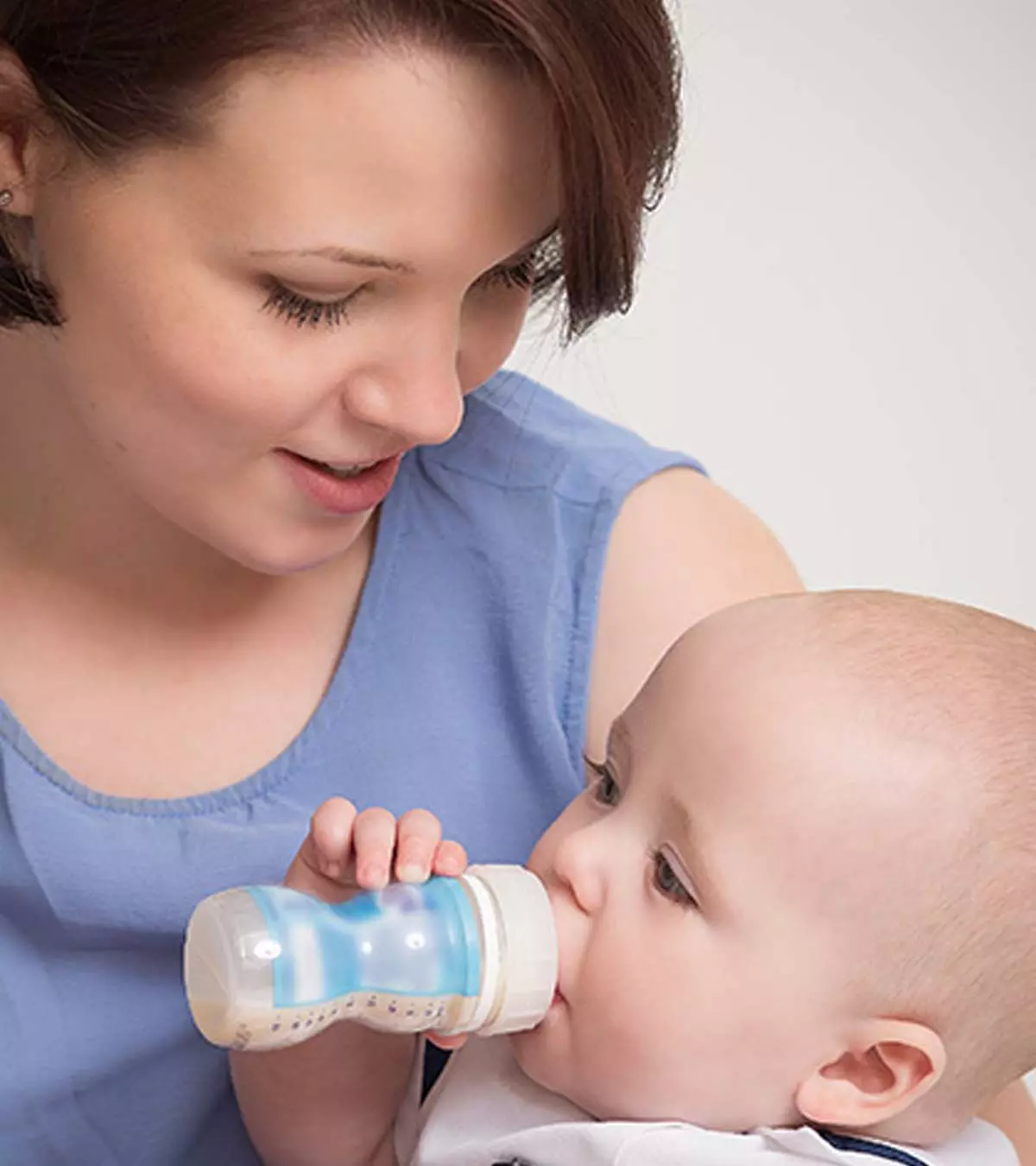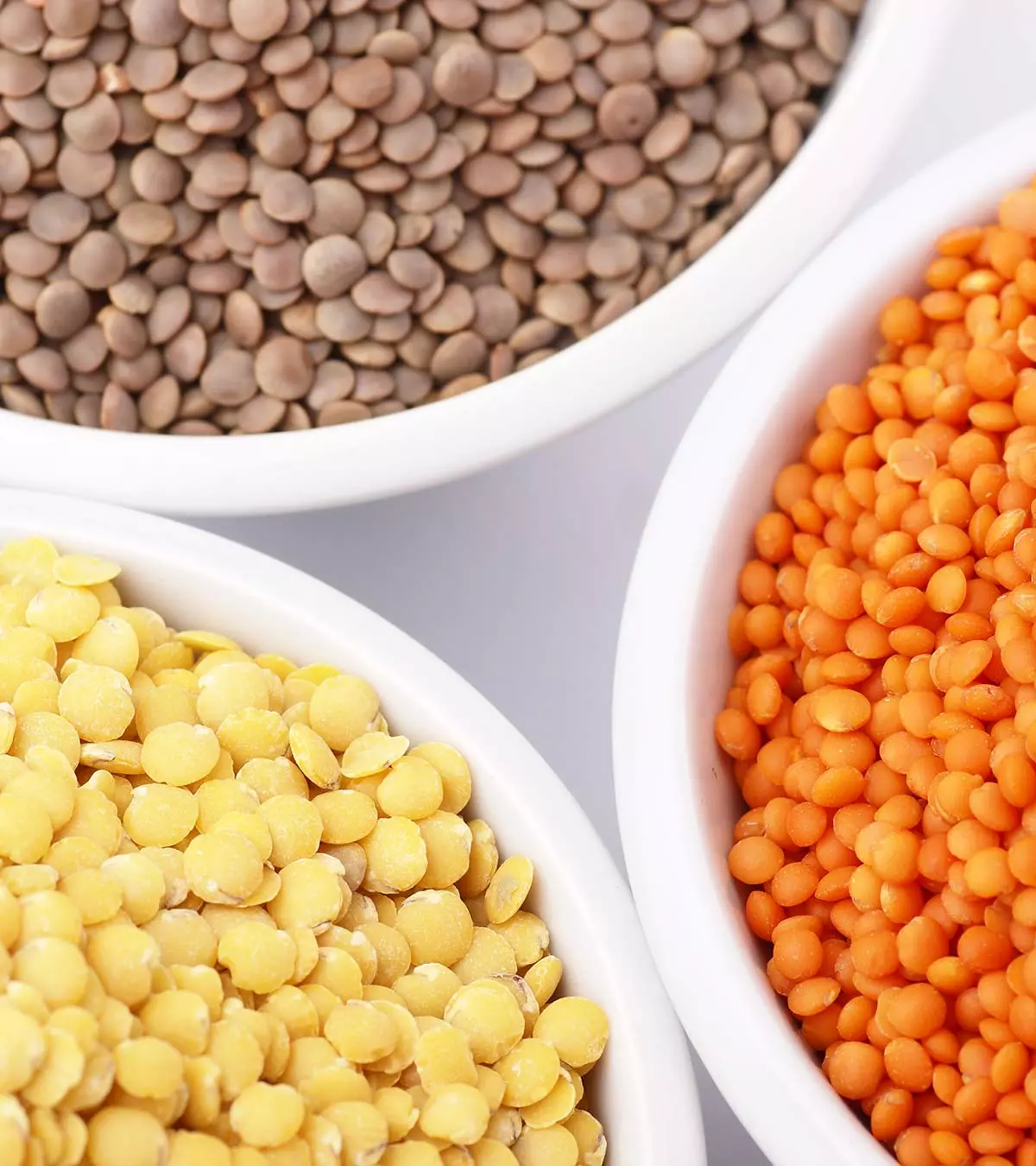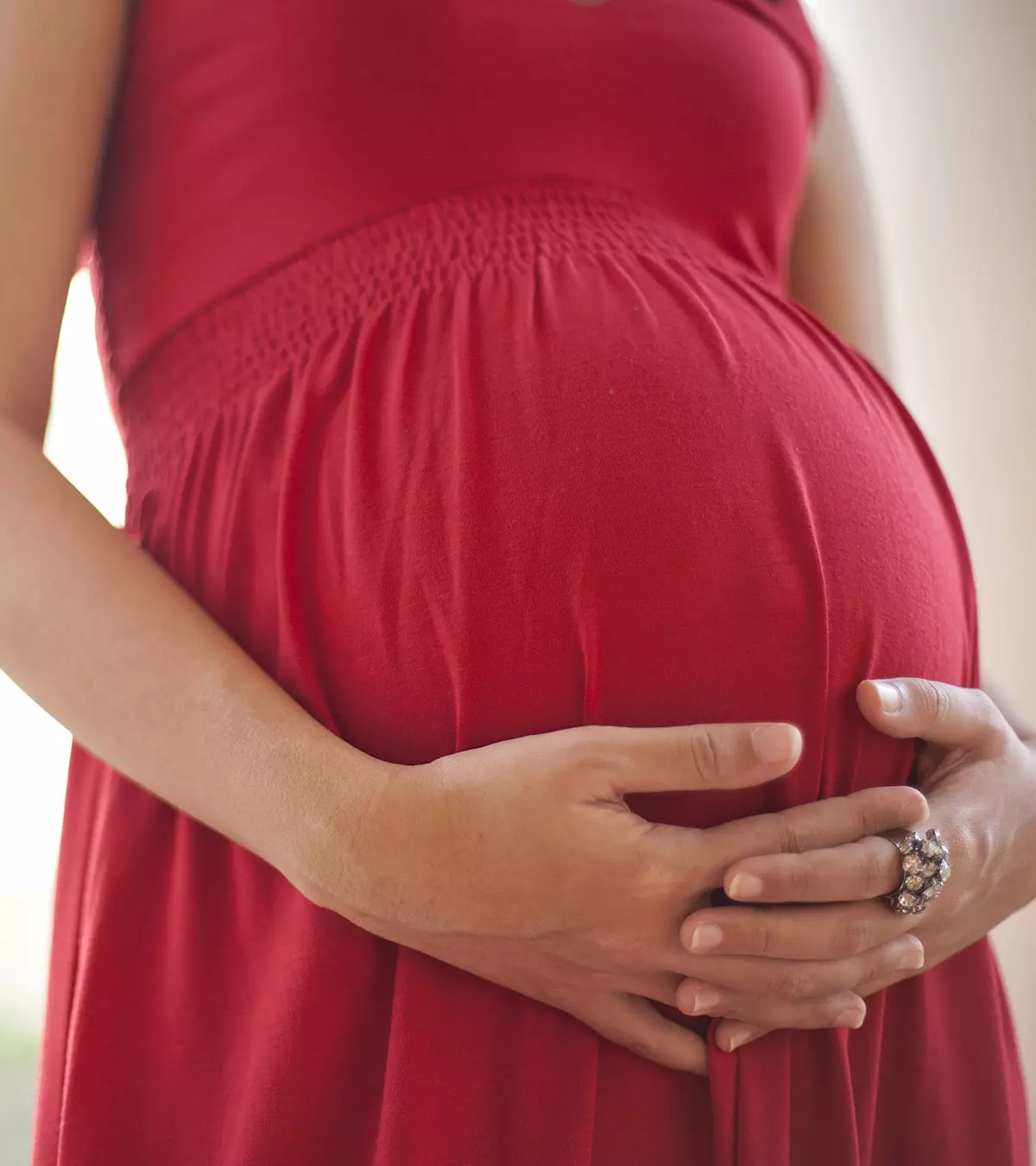
Image: Shutterstock
Food cravings are common during pregnancy, and sugar cravings constitute a big part of them. Can eating too much sugar during pregnancy harm the baby? In this post, we tell you all about consuming sugar during pregnancy. Irrespective of whether you are pregnant or not, you should always keep your sugar intake in check to avoid complications. So, read on to know how much sugar you can have during pregnancy and learn about the possible side effects of eating excess sugar.
Key Pointers
- High sugar intake during pregnancy can lead to weight gain and gestational diabetes, affecting the baby’s health and development.
- Excessive sugar consumption can spike blood sugar levels, cause fatigue and mood swings, weaken the immune system, and increase the risk of dental problems.
- Opt for natural sweeteners such as honey and fruit instead of foods high in added sugars such as candy, soda, and baked goods.
- Maintain a balanced diet comprising fruits, vegetables, whole grains, and lean proteins.
Can You Eat Sugar While Pregnant?
You can eat sugar and sugary foods as long as it is not in large quantities. But if you have gestational diabetes, you should be extra careful about your sugar intake.
Also, note that there is more refined sugar in candies, cookies, cakes, and soft drinks that provide zero nutrition. If you are having them often, then you need to replace them with healthier options such as whole grains, fruits, and vegetables that have natural sugars for getting optimal fetal nutrition.
 Quick fact
Quick factHow Much Sugar Can You Safely Consume During Pregnancy?
There are no standard recommendations for sugar consumption during pregnancy. The ideal sugar intake for you depends on your metabolic rateiThe amount of energy that your body requires to perform life-sustaining functions while at rest , blood sugar levels, and weight. In any case, it is good to limit the consumption of sugar to 25 grams or less in a day (1).
Dr. Kimberly Langdon, MD, ob/gyn and CEO of Physician Integrative Laboratories, says, “Pregnancy is a state of insulin resistance due to the release of several pregnancy hormones. This means that the cells are less sensitive to the metabolic effects of insulin, causing slight elevations in blood sugar. Therefore, in pregnancy, target blood glucose levels should be less than 95mg/dL for fasting blood sugar and 140 and 120mg/dL one and two hours after meals, respectively.”
 Point to consider
Point to considerCan Eating Too Much Sugar In Pregnancy Harm The Baby?
Overeating sugary foods or carbohydrates may have an adverse impact on fetal development. Also, excess sugar in the blood due to gestational diabetes or uncontrolled type 2 diabetes can harm the baby.
Extra sugar from increased calorie intake can cross the placenta and increase the fetus’ blood sugar levels. This may result in increased insulin production in the baby’s body and make the baby grow larger, a condition referred to as macrosomia. Studies indicate that 15 to 45 percent of babies born to women with gestational diabetes mellitus may be affected by macrosomia (13). Delivering a large baby can lead to complications such as the need for a cesarean section. It can also be associated with premature birth (2). Dr. Langdon observes, “Macrosomia exposes the baby to complications during childbirth, such as birth injuries, infection, and fatal hypoglycemia (low blood sugar).”
 Did you know?
Did you know?What Are The Possible Side Effects Of Excess Sugar Consumption?
Excess sugar adds empty calories and deprives nutrition that you need during pregnancy.
- Aggravates pregnancy symptoms: Symptoms such as vomiting, heartburn, and mood swings might get worse with excess sugar intake.
- Causes fatigue: Sugary foods provide empty calories and lack nutrition. They contain sucrose, cause a temporary spike in blood sugar, and leave you lethargic and tired.
- Leads to nutritional deficiency: Having a food craving during pregnancy is normal. But if you crave sweets more than other foods, be careful and do not overindulge. Sugars add empty calories and can lead to possible weight gain and nutrient deficiency.
- May cause excessive weight gain: Research indicates that excessive sugar intake might make you gain unhealthy weight during pregnancy, thus increasing the risk for obesity (14). Several studies also establish a link between maternal consumption of sugars or artificial sweeteners during pregnancy and the risk of overweight or obesity in the baby (15).
- Acute fatty liveriA serious condition in which fats may build up in the liver increasing the risk for complications like liver failure (AFL): A maternal diet rich in fructoseiA naturally occurring sugar compound found in fruits, vegetables, honey, and sugarcane -containing sugars can lead to fatty liver syndrome. It can also affect the fetal metabolism and thus lead to obesity or type II diabetes later in life (3).
- Might increase the risk of preeclampsia: High sugar intake influences the risk of preeclampsiaiA serious complication of pregnancy characterized by high blood pressure in pregnant women (4).To avoid these possible risks, cut down the sugar intake. According to the US Centers for Disease Control and Prevention (US CDC), preeclampsia is estimated to affect five to seven percent of all pregnancies and is a leading cause of maternal deaths (16).
Dr. Langdon adds, “If a pregnant woman’s glycemic control is inadequate, she may develop gum disease, tooth decay, and oral infections. Uncontrolled blood sugar in pregnancy can lead to gestational diabetes. In the presence of gestational diabetes, oral health problems can worsen or take longer to heal.”
Tips To Reduce Sugar Consumption During Pregnancy
To limit sugar intake:
- Limit sugar-containing foods and snacks. Or, you can stop eating refined sugar altogether. If that’s not possible, at least cut down on cakes, ice creams, pastries, and other snacks with added sugar.
- Include sweet fruits as much as possible. If you crave sugar, eat fruits such as mango, pineapple, and strawberry. Avoid fruit juices as they contain excess sugars.
- Avoid artificial sweeteners. Their harmful effects last even after pregnancy. Include better alternatives such as coconut sugar, date syrup, organic palm jaggery, or honey in moderation.
 Quick fact
Quick fact- Pay attention to ingredients in packaged foods. Know the amount of sugar present in foods such as breakfast cereal, peanut butter, sauces and such. Consider only those with low sugar content.
- Do not keep candies, ice creams, cookies or any sugary foods at home. Buy them only when you want to have something sweet.
- Limit your sugar intake or find alternatives. Avoid excess jam on bread and use only one teaspoon of sugar instead of two for your tea or coffee. Additionally, limit your chocolate or ice cream consumption. If you want to replace sugar with artificial sweeteners, speak to a doctor and know about the safety of artificial sweeteners during pregnancy.
Or, you can just replace white sugar and artificial sweeteners with healthier alternatives.
Healthy Foods That Lower Blood Sugar In Pregnant Women
Improved diet and exercise can help lower blood sugar levels naturally. Healthy foods you should include in the diet are:
- Low-glycemic foods: Include more of low-glycemic index foods such as whole grains, beans, barley, oatmeal, fruits, and vegetables. These take longer to digest and prevent spikes in blood sugar.
- Probiotics: Probiotics are live, stomach-friendly bacteria that promote digestion. They regulate carbohydrate metabolism and maintain blood sugar levels. Natural yogurt is one of the best probiotics you can take (5).
- Fiber foods: Insoluble fiber maintains digestive health, and soluble fiber improves sugar levels. Oats and legumes have the highest levels of soluble fibers, while insoluble fiber is found in whole wheat foods. Fruits and vegetables contain both kinds of fiber.
- Proteins and healthy fats: Include more lean protein sources such as nuts, eggs, and poultry. Macronutrients like protein controls blood sugar levels, keeps you full and boosts energy. Healthy fats found in nuts, olive oil and avocados also keep you satiated and prevent craving for unhealthy foods.
Still got questions about eating sugar in pregnancy?
Frequently Asked Questions
1. Can sugar cause heartburn during pregnancy?
Sugar will not directly cause heartburn, but it can make your condition worse. Sugar found in certain foods such as chocolate, citrus fruits, peppermint, fatty foods and caffeinated beverages can trigger heartburn symptoms and should be avoided.
2. Can sugar cause diarrhea during pregnancy?
Sugar doesn’t cause diarrhea but can aggravate it. Avoid high-sugar fruit juices and soft drinks when you already have diarrhea. They draw more water into the stomach and make diarrhea worse.
3 Can sugar terminate the pregnancy?
No. Excess sugar consumption can only make you nauseous, but it will not terminate the pregnancy.
4. Is there a connection between high blood sugar and autism?
According to research, pregnant women who had gestational diabetes by the 26th week of pregnancy are 42% more likely to have children with autism. Researchers postulated that exposure of the uterus to high blood sugar would affect the brain development of the baby and increase the risk of developmental disorders (6).
5. Can sugar cause birth defects in pregnancy?
Uncontrolled sugar intake and glucose levels can cause birth defects in your baby. Several birth defects, such as congenital heart disease or brain and spine deformities, can be observed if the levels of sugar are not controlled (12).
6. Does sugar make your baby bigger?
There is no conclusive evidence to suggest that sugar makes your baby bigger. However, it is important to note that sugar consumption during pregnancy can result in gestational diabetes and even preterm birth. There is a high chance that your baby may become overweight in later life (11).
7. How can I stop eating sugar during pregnancy?
There is no right or wrong way for a person to stop eating sugar. Only after consulting your doctor about your specific needs will you be able to control your sugar intake.
Refined sugar is harmful to everyone. Sugar can be addictive, and its craving may increase during pregnancy. Excessive sugar in pregnancy can additionally increase the risk of gestational diabetes and other pregnancy problems, such as weight gain, high blood pressure, fatigue, and nutrient deficiencies that may be harmful to fetal growth and development. So, replace refined white sugar with unrefined ones from natural sources. Include more fruits in your diet to curb sugar cravings. Scan through the labels of packaged foods and snacks to know their sugar content and avoid artificial sweeteners.
Infographic: Healthy Swaps For Sugar
It is not unusual to have a craving for sugary foods during pregnancy. However, excess consumption of sugary food is not recommended generally and especially when you are expecting. Therefore, to help satiate your palate and ensure your and your baby’s health, we bring you some healthy alternatives to the most tempting high-sugar foods. Illustration: Momjunction Design Team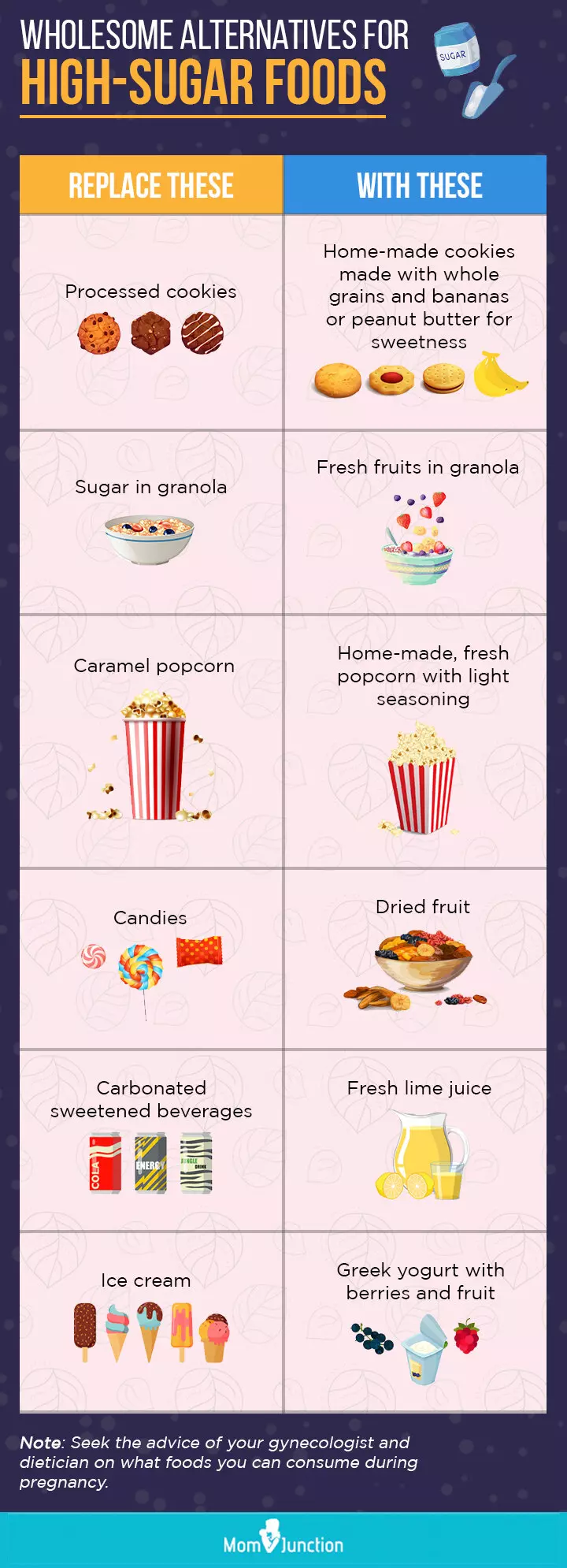
Illustration: How Much Sugar In Pregnancy Is Too Much And Its Effects
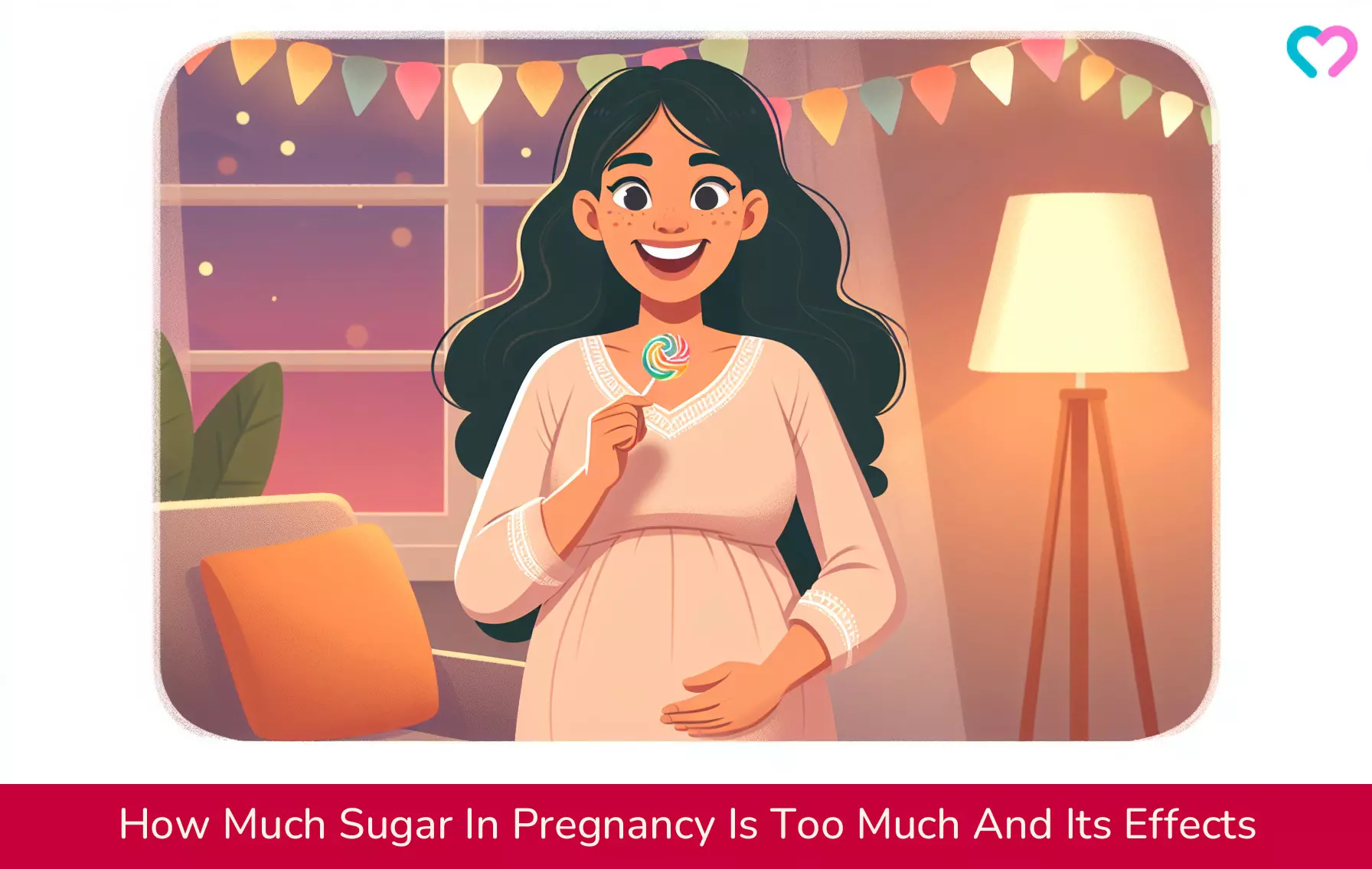
Image: Dall·E/MomJunction Design Team
References
- How much is too much?.
https://sugarscience.ucsf.edu/the-growing-concern-of-overconsumption.html#.YnpmMdpBzIU - Gestational Age Infant Birth Weight and Subsequent Risk of Type 2 Diabetes in Mothers: Nurses’ Health Study II.
https://www.cdc.gov/pcd/issues/2013/12_0336.htm - Hin Hin Koand Eric Yoshida; Acute fatty liver of pregnancy.
https://www.ncbi.nlm.nih.gov/pmc/articles/PMC2538964/ - I Borgen et al; Maternal sugar consumption and risk of preeclampsia in nulliparous Norwegian women.
https://pubmed.ncbi.nlm.nih.gov/22713766/ - Jackie Elias et al; Are probiotics safe for use during pregnancy and lactation?.
https://www.ncbi.nlm.nih.gov/pmc/articles/PMC3056676/ - HSE News.
https://hscnews.usc.edu/archives/pdf15/2.8.pdf - About Sugars And Fats.
https://www.thewomens.org.au/images/uploads/fact-sheets/About-sugar-fats-200219.pdf - Dietary Guidelines for Americans 2020–2025
https://journals.lww.com/nutritiontodayonline/Fulltext/2021/11000/Dietary_Guidelines_for_Americans_2020_2025_.5.aspx - Juliana F.W. Cohen et al.; (2018); Associations of Prenatal and Child Sugar Intake With Child Cognition.
https://www.ajpmonline.org/article/S0749-3797(18)31606-4/fulltext#%20 - Artificial Sweeteners and Pregnancy.
https://americanpregnancy.org/healthy-pregnancy/is-it-safe/artificial-sweeteners-and-pregnancy/ - Berger Paige K. et al; Association of Prenatal Sugar Consumption with Newborn Brain Tissue Organization.
https://www.ncbi.nlm.nih.gov/pmc/articles/PMC8308814/ - Gripp Karen W. et al; Costello syndrome: clinical phenotype genotype and management guidelines.
https://www.ncbi.nlm.nih.gov/pmc/articles/PMC8238015/ - Kamana Kc Sumisti Shakya and Hua Zhang; Gestational diabetes mellitus and macrosomia: a literature review.
https://pubmed.ncbi.nlm.nih.gov/26045324/ - Rosa Casas Sara Castro Barquero and Ramon Estruch; Impact of Sugary Food Consumption on Pregnancy: A Review.
https://pmc.ncbi.nlm.nih.gov/articles/PMC7700555/ - M I Goran 1 J F Plows and E E Ventura; Effects of consuming sugars and alternative sweeteners during pregnancy on maternal and child health: evidence for a secondhand sugar effect.
https://pmc.ncbi.nlm.nih.gov/articles/PMC7441786/ - Preeclampsia Genomics and Public Health.
https://blogs.cdc.gov/genomics/2022/10/25/preeclampsia/
Community Experiences
Join the conversation and become a part of our nurturing community! Share your stories, experiences, and insights to connect with fellow parents.
Read full bio of Claudia Wilson
- Dr. Kimberly Langdon is a gynecologist with 19 years of experience wherein she delivered more than 2,000 babies. She is currently working as vice-president, product development and research at Physician Integrative Laboratories in the US. She did her doctor of medicine from the Ohio State University.
 Dr. Kimberly Langdon is a gynecologist with 19 years of experience wherein she delivered more than 2,000 babies. She is currently working as vice-president, product development and research at Physician Integrative Laboratories in the US. She did her doctor of medicine from the Ohio State University.
Dr. Kimberly Langdon is a gynecologist with 19 years of experience wherein she delivered more than 2,000 babies. She is currently working as vice-president, product development and research at Physician Integrative Laboratories in the US. She did her doctor of medicine from the Ohio State University.
Read full bio of Rebecca Malachi
Read full bio of Swati Patwal
Read full bio of Lorraine Teron









